- 9 March 2016
- Africa

EPRDF regime's self image of ethnically Balkanized Ethiopia, established by late Dictator Melese Zenawie. Freedom of Press is Dead in ethnocracy based irridentism. Fertile land is grabbed by foreign speculators, over 5 million are starving. 500'000 kids are on the streets. Millions are displaced by force. The regime is arming proxy warriors. Dams are built wantonly risking the existence of millions of indigenous people. Eritreans Moles are Ruling even after seceding in 1991.
Translate
Monday, March 21, 2016
Thursday, March 17, 2016
Monday, March 14, 2016
Group: Ethiopia forces kill, rape in clashes with protesters | Fox News
ADDIS ABABA, Ethiopia – A rights group is accusing Ethiopia's security forces of carrying out serious rights abuses during recent protests in the country's Oromia region.
The Ethiopia-based Human Rights Council said Monday that it found evidence of extrajudicial killings, tortures, beatings, illegal detentions, forced disappearances and arson attacks during and after the protests.
In November, protests erupted in the Oromia region over a proposed plan to expand the municipal boundary of the capital, Addis Ababa, which some believed would lead to the displacement of farmers.
Authorities have since abandoned the plan but clashes continue. The Human Right Council said at least 103 people have been killed.
Ethiopian Prime Minister Hailemariam Desalegn recently told lawmakers he is "apologetic for the death and destruction" that happened during the protests.
What do Oromo protests mean for Ethiopian unity? - BBC News
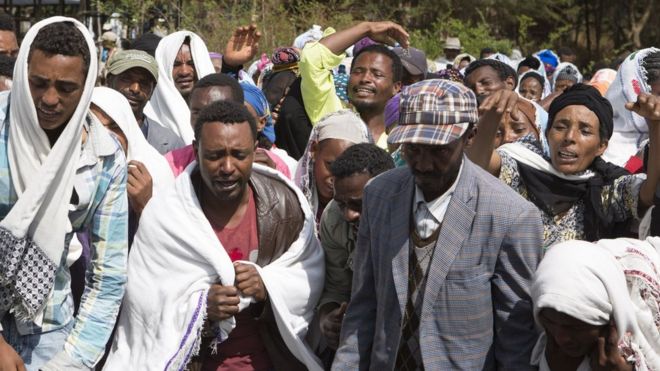 Image copyrightAFP
Image copyrightAFPAs protests in Ethiopia over the rights of the country's Oromo people continue, Addis Ababa-based journalist James Jeffrey considers if they are threatening the country's unity.
The latest round of bloody protests over Oromo rights had a tragically surreal beginning.
A bus filled with a wedding party taking the bride to the groom's home was stopped at a routine checkpoint on 12 February near the southern Ethiopian town of Shashamane.
Local police told revellers to turn off the nationalistic Oromo music playing. They refused and the bus drove off.
The situation then rapidly escalated and reports indicate at least one person died and three others were injured after police fired shots.
The exact details of the incident are hard to verify, but what is clear is that days of protest followed, including armed local militia clashing with federal police, leaving seven policemen dead, the government says.
Oromia at a glance:
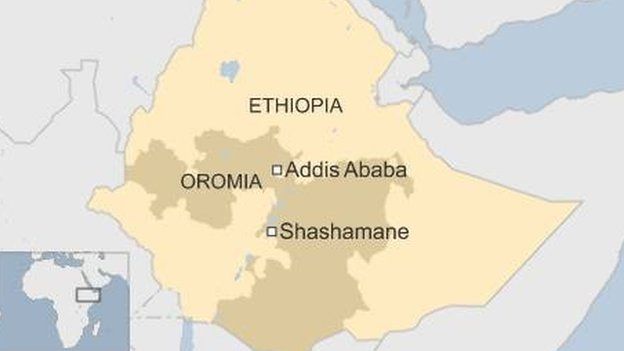
- Oromia is Ethiopia's largest region, surrounding the capital, Addis Ababa
- Oromo are Ethiopia's biggest ethnic group - making up about a third of Ethiopia's 95 million people
- The Oromo Federalist Congress (OFC) is Oromia's largest legally registered political party, but holds no seats in parliament
Since last November, Ethiopia has seen a third phase of the recent unrest in the Oromia region which has been unprecedented in its longevity and geographical spread.
The region is the largest in Ethiopia and the Oromos, who make up a third of the population, are the biggest of the country's more than 80 ethnic groups.
Initially the protests were in reaction to a plan to expand the administrative border of the capital, Addis Ababa, which is encircled by Oromia.
But even after the region's governing party, the Oromo People's Democratic Organisation, which is part of Ethiopia's governing coalition, shelved the plan in January, protests have continued.
Historical scars
"There is a strong sense of victimhood, extending back 150 years," says Daniel Berhane, a prominent Addis Ababa-based political blogger, covering Ethiopia for the website Horn Affairs.
"People remember the history. The scars are still alive, such as how the Oromo language was suppressed until 20 years ago."
Despite there being an ethnic basis to these protests, observers say that the deeper issues behind them, frustrations over land ownership, corruption, political and economic marginalisation, are familiar to many disenchanted Ethiopians.
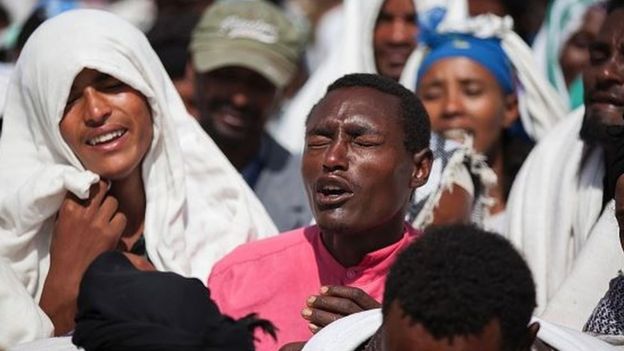 Image copyrightAFP
Image copyrightAFPThe numbers killed since November following clashes between protesters and security forces given by international rights organisations, activists and observers range from 80 to 250.
The government has dismissed various death tolls as exaggerations, and said that a recent report on the situation by the New York-based Human Rights Watch (HRW) was an "absolute lie".
'Organised gangs'
Ethiopian citizens had a right to question the plan to expand Addis Ababa, but the protests were hijacked by people looking to incite violence, according to government spokesman Getachew Reda.
He says the security forces have faced "organised armed gangs burning down buildings belonging to private citizens, along with government installations".
A security analyst who closely watches Ethiopia says "there could be radical elements and factions taking advantage, but you cannot define a movement by isolated events".
Despite violent incidents, the protests have been described as "largely peaceful" by HRW and observers in Ethiopia.
"There is a perception of lack of competence in governance on the ground," Mr Daniel says.
"There were easy remedies to appease initial protests, it was not hard science, but the right actions were not taken."
In its defence, the government says it heeded the call of the people when it came to concerns over the Addis Ababa plan, and observers say the government deserves credit for withdrawing it.
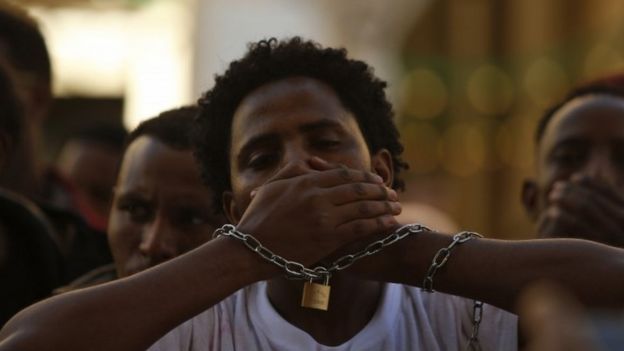 Image copyrightReuters
Image copyrightReutersBut the same political observers add that the government must allow Ethiopians to exercise their constitutional right to protest, and handle events in a way that does not escalate violence.
The government has said that the protests and information about them have been manipulated by foreign-based opposition groups who are using social media to exaggerate what is going on for their own ends.
"The diaspora magnifies news of what is happening, yes, but no matter how much it agitates, it cannot direct [what's happening] at village level in Ethiopia," says Jawar Mohammed, executive director of one of those accused of fomenting conflict, US-based broadcaster Oromia Media Network (OMN).
"This is about dissatisfaction."
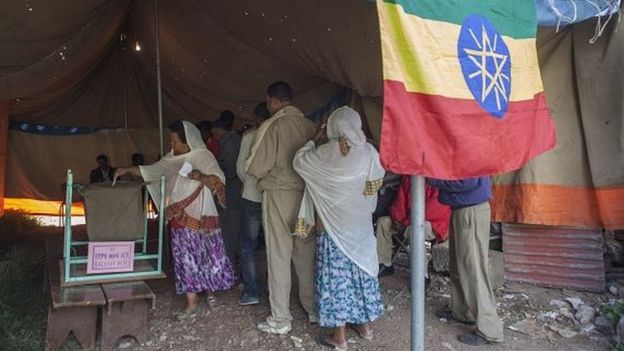 Image copyrightAFP
Image copyrightAFPMr Jawar says the imprisonment of leaders of the Oromo Federalist Congress party, Oromia's largest legally registered opposition political party, along with thousands of other Oromo political prisoners, makes it difficult to negotiate a lasting solution.
"Also what is the UK and US doing? As major donors to Ethiopia they should be taking the lead to get the government to work out an agreement."
This is a long way from the heady days of Ethiopia's new federal constitution after the overthrow of the military dictatorship in 1991.
That introduced a decentralised system of ethnic federalism, but this jars with the dominance of the governing Ethiopian People's Revolutionary Democratic Front (EPRDF), which, along with its allies, holds every seat in parliament.
Federal tensions
"The ruling government is a victim of its own success," the security analyst says.
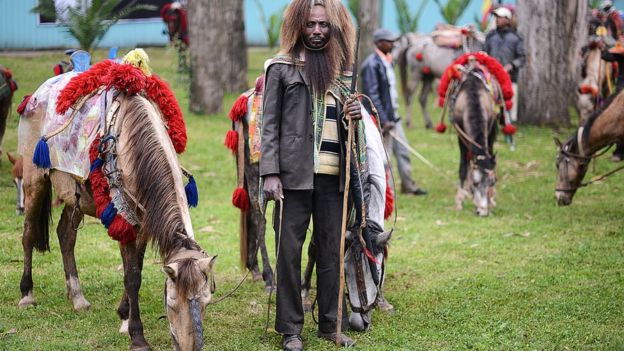 Image copyrightAFP
Image copyrightAFP"The constitution it developed made promises and people trusted the EPRDF. Now people are demanding those rights and the government is responding with bullets and violence."
He adds that the government has expanded basic services and infrastructure, and appears to respect different cultural and ethnic identities, but it cannot reconcile this with its more authoritarian decision-making process.
The government's hitherto successful job of holding together this particularly heterogeneous federation is not about to crumble, according to observers here.
But things may get worse before they get better, unless underlying sources of friction and frustration are addressed.
Ethiopia gains in push for UN Security Council seat
By Tesfa-Alem Tekle
March 13, 2016 (ADDIS ABABA) – Ethiopia’s bid to secure membership of the United Nations Security Council (UNSC) is gaining momentum with Brazil being the latest country to back the horn of African nation, a foreign affairs ministry official said Sunday.
Ethiopia, currently the only East African country, has wider chances of becoming a non-permanent member in the world body’s powerful panel.
The spokesperson for Ethiopia’s foreign affairs ministry, Tewolde Mulugeta, said a number of African nations have backed Addis Ababa’s current bid.
Brazil’s foreign affairs minister, Mauro Viera told reporters in Addis Ababa that the South American nation supports Ethiopia’s bid for a non-permanent seat at the UNSC.
“Ethiopia would contribute a lot if elected as a non-permanent member of the Council”, Viera told reporters Saturday.
“With its ample experience in regional, continental and global peacekeeping operation, Ethiopia would have an immense contribution in the Council,” he added.
The African Union (AU), during its 26th Ordinary Session of the Assembly of Heads of State and Government held last January, endorsed Ethiopia’s candidacy for the election to be held in New York in June.
Ethiopia intends to become a key player in the UN Security Council’s efforts in maintaining international peace and security.
If elected, Ethiopia vows to boost roles of African countries in the global decision making process which had been dominated by western powers.
Addis Ababa is currently doing lobbying activities and election campaigns by drawing best experiences from member states.
There are a number of supporting factors that would help Ethiopia in its efforts to secure a non-permanent seat in the in the UN influential body.
One among others - Ethiopia is the seat of the African Union (AU) and it has a significant role in maintaining regional peace and security.
It has long been a key security partner to the west particularly on the fight against terrorism. With over 8,000 personnel, Ethiopia is also the second most peace force contributing nation deployed in various UN peacekeeping missions.
The country is one of the two African founding members of the United Nations Organization and has also an experience in serving a non-permanent seat in two occasions in 1967-68 and 1989-90.
The UNSC includes 10 non-permanent members, with five elected each year. China, France, Russia, the United Kingdom and United States make up the five permanent members of the Security Council with veto powers.
March 13, 2016 (ADDIS ABABA) – Ethiopia’s bid to secure membership of the United Nations Security Council (UNSC) is gaining momentum with Brazil being the latest country to back the horn of African nation, a foreign affairs ministry official said Sunday.

- A United Nations Security Council session (UN)
Ethiopia, currently the only East African country, has wider chances of becoming a non-permanent member in the world body’s powerful panel.
The spokesperson for Ethiopia’s foreign affairs ministry, Tewolde Mulugeta, said a number of African nations have backed Addis Ababa’s current bid.
Brazil’s foreign affairs minister, Mauro Viera told reporters in Addis Ababa that the South American nation supports Ethiopia’s bid for a non-permanent seat at the UNSC.
“Ethiopia would contribute a lot if elected as a non-permanent member of the Council”, Viera told reporters Saturday.
“With its ample experience in regional, continental and global peacekeeping operation, Ethiopia would have an immense contribution in the Council,” he added.
The African Union (AU), during its 26th Ordinary Session of the Assembly of Heads of State and Government held last January, endorsed Ethiopia’s candidacy for the election to be held in New York in June.
Ethiopia intends to become a key player in the UN Security Council’s efforts in maintaining international peace and security.
If elected, Ethiopia vows to boost roles of African countries in the global decision making process which had been dominated by western powers.
Addis Ababa is currently doing lobbying activities and election campaigns by drawing best experiences from member states.
There are a number of supporting factors that would help Ethiopia in its efforts to secure a non-permanent seat in the in the UN influential body.
One among others - Ethiopia is the seat of the African Union (AU) and it has a significant role in maintaining regional peace and security.
It has long been a key security partner to the west particularly on the fight against terrorism. With over 8,000 personnel, Ethiopia is also the second most peace force contributing nation deployed in various UN peacekeeping missions.
The country is one of the two African founding members of the United Nations Organization and has also an experience in serving a non-permanent seat in two occasions in 1967-68 and 1989-90.
The UNSC includes 10 non-permanent members, with five elected each year. China, France, Russia, the United Kingdom and United States make up the five permanent members of the Security Council with veto powers.
Wednesday, March 9, 2016
What do Oromo protests mean for Ethiopian unity? - BBC News
What do Oromo protests mean for Ethiopian unity?
- 9 hours ago
- From the sectionAfrica
 Image copyrightAFP
Image copyrightAFPAs protests in Ethiopia over the rights of the country's Oromo people continue, Addis Ababa-based journalist James Jeffrey considers if they are threatening the country's unity.
The latest round of bloody protests over Oromo rights had a tragically surreal beginning.
A bus filled with a wedding party taking the bride to the groom's home was stopped at a routine checkpoint on 12 February near the southern Ethiopian town of Shashamane.
Local police told revellers to turn off the nationalistic Oromo music playing. They refused and the bus drove off.
The situation then rapidly escalated and reports indicate at least one person died and three others were injured after police fired shots.
The exact details of the incident are hard to verify, but what is clear is that days of protest followed, including armed local militia clashing with federal police, leaving seven policemen dead, the government says.
Oromia at a glance:

- Oromia is Ethiopia's largest region, surrounding the capital, Addis Ababa
- Oromo are Ethiopia's biggest ethnic group - making up about a third of Ethiopia's 95 million people
- The Oromo Federalist Congress (OFC) is Oromia's largest legally registered political party, but holds no seats in parliament
Since last November, Ethiopia has seen a third phase of the recent unrest in the Oromia region which has been unprecedented in its longevity and geographical spread.
The region is the largest in Ethiopia and the Oromos, who make up a third of the population, are the biggest of the country's more than 80 ethnic groups.
Initially the protests were in reaction to a plan to expand the administrative border of the capital, Addis Ababa, which is encircled by Oromia.
But even after the region's governing party, the Oromo People's Democratic Organisation, which is part of Ethiopia's governing coalition, shelved the plan in January, protests have continued.
Historical scars
"There is a strong sense of victimhood, extending back 150 years," says Daniel Berhane, a prominent Addis Ababa-based political blogger, covering Ethiopia for the website Horn Affairs.
"People remember the history. The scars are still alive, such as how the Oromo language was suppressed until 20 years ago."
Despite there being an ethnic basis to these protests, observers say that the deeper issues behind them, frustrations over land ownership, corruption, political and economic marginalisation, are familiar to many disenchanted Ethiopians.
 Image copyrightAFP
Image copyrightAFPThe numbers killed since November following clashes between protesters and security forces given by international rights organisations, activists and observers range from 80 to 250.
The government has dismissed various death tolls as exaggerations, and said that a recent report on the situation by the New York-based Human Rights Watch (HRW) was an "absolute lie".
'Organised gangs'
Ethiopian citizens had a right to question the plan to expand Addis Ababa, but the protests were hijacked by people looking to incite violence, according to government spokesman Getachew Reda.
He says the security forces have faced "organised armed gangs burning down buildings belonging to private citizens, along with government installations".
A security analyst who closely watches Ethiopia says "there could be radical elements and factions taking advantage, but you cannot define a movement by isolated events".
Despite violent incidents, the protests have been described as "largely peaceful" by HRW and observers in Ethiopia.
"There is a perception of lack of competence in governance on the ground," Mr Daniel says.
"There were easy remedies to appease initial protests, it was not hard science, but the right actions were not taken."
In its defence, the government says it heeded the call of the people when it came to concerns over the Addis Ababa plan, and observers say the government deserves credit for withdrawing it.
 Image copyrightReuters
Image copyrightReutersBut the same political observers add that the government must allow Ethiopians to exercise their constitutional right to protest, and handle events in a way that does not escalate violence.
The government has said that the protests and information about them have been manipulated by foreign-based opposition groups who are using social media to exaggerate what is going on for their own ends.
"The diaspora magnifies news of what is happening, yes, but no matter how much it agitates, it cannot direct [what's happening] at village level in Ethiopia," says Jawar Mohammed, executive director of one of those accused of fomenting conflict, US-based broadcaster Oromia Media Network (OMN).
"This is about dissatisfaction."
 Image copyrightAFP
Image copyrightAFPMr Jawar says the imprisonment of leaders of the Oromo Federalist Congress party, Oromia's largest legally registered opposition political party, along with thousands of other Oromo political prisoners, makes it difficult to negotiate a lasting solution.
"Also what is the UK and US doing? As major donors to Ethiopia they should be taking the lead to get the government to work out an agreement."
This is a long way from the heady days of Ethiopia's new federal constitution after the overthrow of the military dictatorship in 1991.
That introduced a decentralised system of ethnic federalism, but this jars with the dominance of the governing Ethiopian People's Revolutionary Democratic Front (EPRDF), which, along with its allies, holds every seat in parliament.
Federal tensions
"The ruling government is a victim of its own success," the security analyst says.
 Image copyrightAFP
Image copyrightAFP"The constitution it developed made promises and people trusted the EPRDF. Now people are demanding those rights and the government is responding with bullets and violence."
He adds that the government has expanded basic services and infrastructure, and appears to respect different cultural and ethnic identities, but it cannot reconcile this with its more authoritarian decision-making process.
The government's hitherto successful job of holding together this particularly heterogeneous federation is not about to crumble, according to observers here.
But things may get worse before they get better, unless underlying sources of friction and frustration are addressed.
Tuesday, March 1, 2016
Addis Abeba and its surroundings hit by massive taxi drivers’ strike

 Taxi drivers in Addis Abeba and its surroundings are striking as of this morning against a new traffic regulation which started to be implemented as of Monday 22 February.
Taxi drivers in Addis Abeba and its surroundings are striking as of this morning against a new traffic regulation which started to be implemented as of Monday 22 February.In 2009 the Addis Abeba City Council favorably voted to ratify the new traffic regulation, Road Transport and Traffic Control Regulation. Following the 2009 ratification of the amended regulation, the Addis Abeba Transport Bureau (AATB) claims to have had discussions with taxi and city mid-bus owners’ associations as well as the society at large before reaching at the recent decision to implement to regulation, seen by many as too strict and unpractical.
Up on the news that the new regulation was being implemented taxi drivers and city dwellers have taken to radio stations call-ins expressing their fears that the regulation ignores several circumstances, including shortages of proper taxi parking areas in the city, bad road conditions and the corruptible nature of traffic police officers.
Stranded commuters around Kotebe area
The new Traffic Control Regulation has six categories that begin from deducting two points for light traffic law offenses such as improper parking and commuting extra passengers beyond the carrying capacity of the taxis. The Regulation stipulates a six month suspension of driving licenses and additional driving lessons for drivers who lost 14 -16 points due to previous offenses. A driver who has 17 -19 points deducted from his/her records will get his/her driving license suspended for a year; and any driver who gets 20 and above points deducted will have his/her driving license permanently revoked and can only re-apply for a fresh driving lessons after a gap of two years.
The new traffice regulation faced resistance from drivers
Yabibal Addis, head of the Addis Ababa Transport Bureau (AATB), said the regulation was “more than necessary” as it intends to curb the increasing traffic accidents in the country that are resulting in the death of more than 4,000 Ethiopians every year, and injures twice that number. Property damages due to traffic accidents during the year 2014 – 1015 were estimated to be slightly more than one billion ETB, according to Yabibal.
The federal transport bureau announced this morning that the implementation date for the new regulation was postponed by three months. But the announcement came a few hours too late as roads in all the four parts of the city were deserted of minibus taxis starting from early hours affecting thousands of commuters who resorted to walking to make it to their work stations.
According to Abel Daniel, an employee of AATB and one of the hundreds of young Ethiopians involved in regulating taxi routes in the mornings from dispatching areas, as of late this morning the bureau has started registering plate numbers belonging to striking taxi drivers to “penalize those who refuse to come to work”, Abel told Addis Standard. State owned blue buses that provide free transport to the city’s civil servants were seen trying to provide transport to hundreds of thousands of stranded commuters.
AATB estimates that Addis Abeba is home to close to more than 4, 000 white minibuses, 8,000 blue minibuses and more than 500 mid-buses (known as Higer buses), all providing the much needed transport within the city and its environs. It is estimated that the blue and white minibuses together provide transport services to about 1.1 million commuters every day, while the 500 mid-buses transport no less than 700, 000 commuters. The Addis Abeba city bus enterprise operates more than 800 city busses that transport an estimated 1.2 – 1.3 million passengers per day.
Taxi and bus owners’ association are often at odds with the government over issues such as low taxi fares and forced destinations, which are both regulated by the government. Recently discontent is also often heard from taxi drivers and commuters alike over the government’s reluctance to adjust the cost of fuel price in line with the global prices index, which continued plummeting as of the last five months.
Subscribe to:
Posts (Atom)

